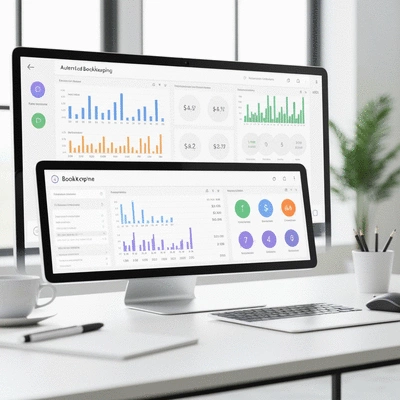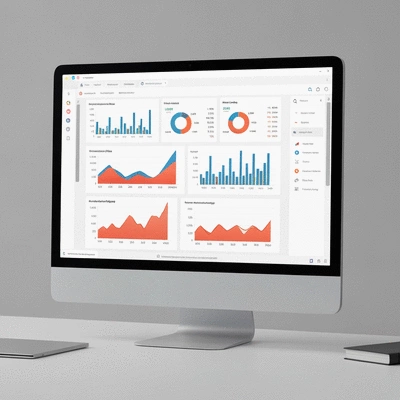In an age where efficiency drives success, understanding how automated bookkeeping can transform your business is crucial. Have you considered the potential of technology to not only streamline your financial processes but also enhance your decision-making capabilities?
What You Will Learn
- Automated bookkeeping simplifies data entry and invoicing, allowing you to focus on strategic decisions.
- Embracing automation reduces human error, leading to more accurate financial records.
- Real-time financial reporting provides valuable insights into cash flow management.
- Using financial metrics and KPIs helps in tracking business performance for informed decision-making.
- Long-term benefits include improved financial insights and scalability as your business grows.
- Incorporating budgeting tools and forecasting enhances strategic planning and prepares for market changes.
Automated Bookkeeping's Impact on Financial Health and Growth
This visual illustrates the key benefits and applications of automated bookkeeping, highlighting its role in enhancing financial health and fostering business growth through improved accuracy, insights, and strategic planning.
What Automated Bookkeeping Offers
Impact on Financial Health
- ✓ Increased Accuracy
- ✓ Improved Cash Flow
- ✓ Timely Insights
- ✓ Better Forecasting
Metrics for Business Growth
- ● Revenue Growth
- ● Profit Margins
- ● Cash Flow
- ● Expense Ratios
Long-Term Benefits of Automation

Understanding Automated Bookkeeping and Its Impact on Financial Health
Have you ever thought about how overwhelming managing your books can be? That’s where automated bookkeeping comes in! By utilizing technology, you can streamline your financial processes, allowing you to focus more on growing your business instead of getting bogged down in paperwork. Let’s dig deeper into what automated bookkeeping really means and how it can positively influence the financial health of your business.
Automated bookkeeping refers to the use of software and digital tools to handle various accounting tasks automatically. This means that the tedious work of data entry, invoicing, and reconciliations can be done with just a few clicks. At Ledger Alliance, we believe that embracing these tools not only saves time but also enhances accuracy, which is crucial for your financial records. For more useful strategies to bolster your business's financial standing, explore building your small business finances.
What is Automated Bookkeeping?
Automated bookkeeping encompasses a range of software solutions designed to manage financial records without the need for manual input. These systems capture and process data, allowing for seamless integration with other business applications. Think of it as your digital accounting assistant that takes care of repetitive tasks while you focus on strategic decisions!
- Data entry automation
- Real-time financial reporting
- Integration with bank accounts and payment systems
- Expense tracking and management
By implementing automated bookkeeping, you can ensure that your financial records are not only accurate but also accessible at any time, enabling informed decision-making based on current data.
The Connection Between Automated Bookkeeping and Financial Health
So, how does automated bookkeeping impact your financial health? Well, the connection is clear. When your bookkeeping is automated, you reduce the likelihood of human error, which can lead to costly mistakes. More importantly, accurate records give you better visibility into your cash flow, helping you make proactive financial decisions.
- Increased accuracy in financial reporting
- Improved cash flow management
- Timely insights into financial performance
- Ability to forecast future cash needs
As a small business owner, having a clear picture of your financial landscape ensures you can respond swiftly to challenges and opportunities that arise. For additional insights on maintaining financial integrity, consider these essential tax compliance tips for small businesses.
How Automated Bookkeeping Software Enhances Financial Reporting
Automated bookkeeping software is a game-changer when it comes to financial reporting. It allows you to generate reports effortlessly and review your financial health without sifting through piles of paperwork. Imagine having your income statements, balance sheets, and cash flow statements ready at the touch of a button!
- Customized reporting templates to fit your business needs
- Automated alerts for financial milestones
- Visual dashboards for quick insights and trends
- Integration with budgeting tools for comprehensive analysis
This level of reporting capability not only saves time but also empowers you to make data-driven decisions that support sustainable growth for your business. With these insights at your fingertips, you can confidently steer your company toward financial stability.
Interactive Poll: Your Thoughts on Automation!
As you consider the transition to automated bookkeeping, we’d love to hear from you! What aspect of automated bookkeeping excites you the most?
Maximizing the Benefits of Automated Bookkeeping for Business Growth
As a financial strategist, I've seen firsthand how automated bookkeeping can transform a business's financial landscape. It’s not just about keeping records; it’s about leveraging those records to fuel growth. By maximizing the benefits of automated bookkeeping, you can enhance your financial health and make informed decisions that drive your business forward.
One of the most significant advantages is the ability to track financial metrics that matter. By focusing on KPIs, you gain insights into your performance and areas for improvement. This data-driven approach helps you not only identify trends but also adapt your strategies accordingly.

Tracking Financial Metrics to Measure Improvement, Including KPI Tracking
Implementing automated bookkeeping allows you to effortlessly track essential financial metrics. These metrics can include:
- Revenue Growth: Measure the increase in sales over time.
- Profit Margins: Analyze how much profit you make from your revenues.
- Cash Flow: Keep an eye on your cash inflows and outflows.
- Expense Ratios: Understand the proportion of expenses to income.
- Return on Investment (ROI): Evaluate the profitability of your investments.
By regularly reviewing these metrics, you can make informed adjustments to your business strategy. Remember, the more you know about your financial health, the better equipped you are to make decisions that lead to growth!
Long-Term Benefits of Automation for Business Finance
Embracing bookkeeping automation isn't just a short-term fix; it’s a long-term investment in your business's future. Some long-term benefits include:
- Data Consistency: Automated systems ensure your data is always up to date and accurate.
- Scalability: As your business grows, automated systems can adapt to handle increased volume without significant changes.
- Improved Financial Insights: Enhanced reporting capabilities lead to better forecasting and strategic planning.
- Reduction of Manual Errors: Automation minimizes human errors, leading to more reliable financial reports.
In my experience, businesses that leverage these long-term benefits are better positioned to navigate challenges and seize new opportunities. Staying compliant is also key to long-term success; learn more about Australian SME compliance.
Utilizing Budgeting Tools and Financial Forecasting for Strategic Planning
To truly harness the power of automated bookkeeping, it’s essential to incorporate budgeting tools and financial forecasting into your strategy. Here’s how:
- Set Clear Budgets: Use automated tools to create and monitor budgets tailored to your business goals.
- Forecast Future Financial Performance: Leverage historical data to predict future trends and prepare for changes in the market.
- Adjust Strategies: Regularly review your budget and forecasts to adjust your strategies based on actual performance.
By utilizing these tools effectively, you can create a roadmap for your business's financial future! Remember, the clearer your path, the more likely you are to achieve your goals.
Next Steps for Embracing Automated Bookkeeping Solutions
Ready to take the plunge into automated bookkeeping? Here’s how to get started on the right foot.
Evaluating Your Current Bookkeeping Process
Before implementing new systems, it's crucial to assess your current bookkeeping process. Ask yourself:
- What are the strengths and weaknesses of my current system?
- How much time do I spend on manual bookkeeping tasks?
- Are there recurring issues that automation could solve?
This evaluation will help you identify areas that need improvement and guide your transition to automation.
Resources and Tools to Get Started with Automation
There are numerous resources available to help you implement bookkeeping automation. Consider exploring:
- Online Courses: Many platforms offer courses on bookkeeping software and automation.
- Consultations: Seeking advice from a financial expert can provide tailored insights for your business.
- Free Trials: Many software providers offer free trials, allowing you to test their tools before committing.
These resources can significantly ease your transition and ensure you’re making informed choices!
Exploring Integration Tools for Enhanced Workflow Management
Lastly, consider the integration tools that will help streamline your workflow. Look for:
- APIs: Application Programming Interfaces can connect various software applications for seamless data flow.
- Third-Party Integrations: Many accounting software options provide integrations with popular business tools.
- Custom Solutions: Depending on your needs, investing in customized solutions may enhance your overall efficiency.
By exploring these integration options, you can maximize the effectiveness of your automated bookkeeping system and continue to focus on what really matters—growing your business!
Frequently Asked Questions About Automated Bookkeeping
Q: What is automated bookkeeping?
A: Automated bookkeeping uses software and digital tools to automatically handle accounting tasks like data entry, invoicing, and reconciliations, reducing manual effort and potential errors.
Q: How does automated bookkeeping improve financial health?
A: It increases accuracy in financial reporting, improves cash flow management, provides timely insights into financial performance, and helps in forecasting future cash needs by reducing human error and offering real-time data.
Q: What kind of financial metrics can be tracked with automated bookkeeping?
A: Automated systems allow you to track essential metrics such as revenue growth, profit margins, cash flow, expense ratios, and return on investment (ROI), providing valuable insights for strategic decisions.
Q: What are the long-term benefits of implementing automated bookkeeping?
A: Long-term benefits include data consistency, scalability to handle business growth, improved financial insights through enhanced reporting, and a significant reduction in manual errors.
Q: How can businesses get started with automated bookkeeping?
A: Begin by evaluating your current bookkeeping process to identify pain points, then explore available resources like online courses, financial expert consultations, and free trials of software. Also, consider integration tools like APIs for seamless workflow management.
Recap of Key Points
Here is a quick recap of the important points discussed in the article:
- Automated bookkeeping streamlines financial processes, reducing manual effort and errors.
- Key benefits include increased accuracy, improved cash flow management, and timely financial insights.
- Utilizing automated bookkeeping software enhances financial reporting capabilities, allowing for easier data analysis.
- Tracking essential financial metrics helps businesses make informed decisions and adapt strategies for growth.
- Incorporating budgeting tools and forecasts is crucial for long-term financial planning and stability.
- Evaluate current bookkeeping processes and explore available resources to effectively transition to automation.










